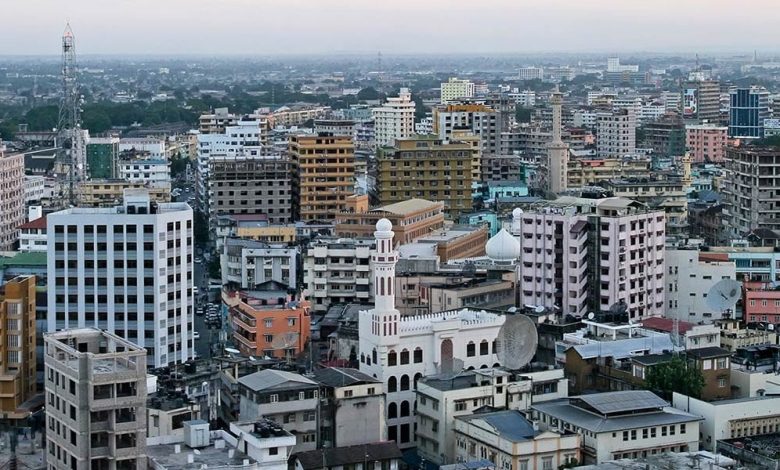Prime
Strong support for Tanzania’s ban on foreigners in small businesses

An aerial view of a section of Kariakoo, Dar es Salaam. Kariakoo is said to be teeming with foreigners involved in small-scale businesses. PHOTO | FILE
What you need to know:
- The new order prohibits foreigners from engaging in 15 specific business sectors considered vital to grassroots economic empowerment
Dar es Salaam. Tanzania’s business community has expressed strong support for a newly gazetted government directive that bars non-citizens from engaging in various small-scale business activities, calling it a timely move to safeguard economic space for locals.
The Business Licensing (Prohibition of Business Activities for Non-Citizens) Order, 2025, was published on July 28 under Government Notice No. 487A and signed by Industry and Trade minister Selemani Jafo. It prohibits foreigners from engaging in 15 specific business sectors considered vital to grassroots economic empowerment and traditionally dominated by Tanzanians.
Among the prohibited activities are retail and wholesale trade (excluding supermarkets), mobile money transactions, small-scale manufacturing, tour guiding, real estate brokerage, parcel delivery services and the operation of micro and small industries. Others include domestic and environmental cleaning services, on-farm crop purchasing, clearing and forwarding services and small-scale mining operations.
Also restricted are the operation of gambling machines outside casino premises, the establishment and running of radio or television stations and the operation of museums or curio shops.
According to the Order, any non-citizen found conducting the listed businesses is subject to legal penalties, including fines of up to Sh10 million or imprisonment for up to six months. Additionally, their visas and residence permits will be cancelled. Tanzanians who front or assist non-citizens in contravening the law may face fines of Sh5 million or a three-month jail term.
The directive has drawn support across trading hubs and industrial circles.
Kariakoo Traders Association chairperson Severine Mushi described the move as bold and necessary, noting that many local businesses have long been undercut by informal competition from foreigners operating without proper investment credentials.
“We’ve welcomed this decision because it protects the livelihoods of Tanzanian traders. For years, we’ve seen an influx of foreigners taking over low-margin businesses in Kariakoo, sometimes even operating informally or under Tanzanian names,” he told The Citizen.
Kariakoo, widely regarded as Dar es Salaam’s commercial heartbeat, has experienced significant foreign participation in electronics, mobile accessories, textile sales and small appliance repairs.
According to Mr Mushi, such developments created an uneven playing field, with Tanzanians being edged out by unregulated or unfair competition.
“Now that the government has closed the door to new licences and renewals for foreigners in these sectors, we expect fairer competition and a return of economic control to Tanzanians. It’s a sign that the economy is returning to its rightful owners—the citizens of this country.”
The regulation includes a transition period for non-citizens who currently hold valid business licences in the listed sectors, allowing them to continue operating until their permits expire. However, renewals will not be permitted.
In the manufacturing and policy space, the Order has also been praised for promoting inclusive industrial growth.
Confederation of Tanzania Industries (CTI) policy and advocacy director Akida Mnyenyelwa said the measure aligns with efforts to empower local innovators and industrialists.
“We want small industries to be in Tanzanian hands. This gives local entrepreneurs a chance to start small, build capacity and grow into medium- and large-scale enterprises,” he said.
Mr Mnyenyelwa noted that the Order does not shut the door on foreign investment altogether but draws a clear line between large-scale and informal participation.
“There are still legitimate pathways for foreign investors to engage with Tanzania’s economy, especially through the Tanzania Investment Centre (TIC) where clear capital thresholds and regulatory compliance are required. What the law discourages is the informal, low-capital penetration of sectors that should be preserved for Tanzanians.”
TIC has since been merged with what used to be known as the Export Processing Zones Authority (EPZA) to form Tanzania Investment and Special Economic Zones Authority (TISEZA).
Mr Mnyenyelwa added that the long-term benefit lies in domestic reinvestment and employment.
“When small businesses are foreign-owned, profits often leave the country. But when a Tanzanian owns the business, they are more likely to reinvest in the local economy, employ fellow Tanzanians and contribute to national development. That’s the multiplier effect we’re looking for.”
The Order is also expected to reshape operations in the tourism, logistics and media sectors. For instance, tour guiding within Tanzania is now exclusively reserved for citizens. Non-citizens are also barred from operating radio and television stations, owning or running museums, or engaging in intermediary roles such as real estate or business brokerage.
Stakeholders say the move reflects a broader national strategy to ensure Tanzanians are at the centre of economic transformation.
“The spirit of the directive is empowerment,” Mr Mnyenyelwa noted. “It’s about protecting spaces where Tanzanians can thrive, while also maintaining room for structured and mutually beneficial foreign investment.”
Observers believe the directive could compel foreign operators to reconsider their strategies in Tanzania, shifting focus towards formalised and capital-intensive investments that bring long-term value to the economy.
The Ministry of Industry and Trade has indicated that enforcement of the Order will be closely monitored through collaboration with local government authorities, immigration services and regulatory bodies.
As the implementation phase begins, Tanzanians are watching closely to see whether the spirit of the directive will be upheld on the ground—and whether it will indeed translate into more business opportunities, fairer competition and a stronger local economy.





